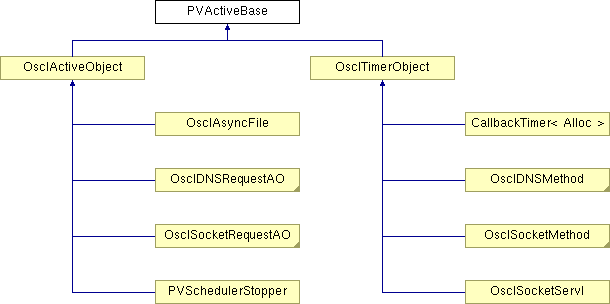
#include <oscl_scheduler_aobase.h>
Inheritance diagram for PVActiveBase:

Public Methods | |
| PVActiveBase (const char name[], int32 pri) | |
| virtual | ~PVActiveBase () |
| bool | IsInAnyQ () |
| virtual int32 | RunError (int32 aError)=0 |
| virtual void | Run ()=0 |
| virtual void | DoCancel ()=0 |
| void | AddToScheduler () |
| void | RemoveFromScheduler () |
| void | Destroy () |
| void | Activate () |
| OSCL_IMPORT_REF bool | IsAdded () const |
| void | Cancel () |
Data Fields | |
| uint32 | iAddedNum |
| OsclNameString< PVEXECNAMELEN > | iName |
| PVThreadContext | iThreadContext |
| PVActiveStats * | iPVActiveStats |
| TReadyQueLink | iPVReadyQLink |
| bool | iBusy |
| OsclAOStatus | iStatus |
Friends | |
| class | PVActiveStats |
| class | OsclSchedulerCommonBase |
| class | OsclActiveObject |
| class | OsclTimerObject |
| class | OsclReadyQ |
| class | OsclReadyCompare |
| class | OsclReadySetPosition |
| class | OsclExecScheduler |
|
||||||||||||
|
|
|
|
|
|
|
|
|
|
Reimplemented in OsclActiveObject, and OsclTimerObject. |
|
|
Reimplemented in OsclActiveObject, and OsclTimerObject. |
|
|
|
|
|
Implements cancellation of an outstanding request. This function is called as part of the active object's Cancel(). It must call the appropriate cancel function offered by the active object's asynchronous service provider. The asynchronous service provider's cancel is expected to act immediately. DoCancel() must not wait for event completion; this is handled by Cancel(). Implemented in OsclDNSRequestAO, OsclSocketRequestAO, OsclActiveObject, and OsclTimerObject. |
|
|
|
|
|
|
|
|
Reimplemented in OsclActiveObject, and OsclTimerObject. |
|
|
Handles an active object's request completion event. A derived class must provide an implementation to handle the completed request. If appropriate, it may issue another request. The function is called by the active scheduler when a request completion event occurs, i.e. after the active scheduler's WaitForAnyRequest() function completes. Before calling this active object's Run() function, the active scheduler has: 1. decided that this is the highest priority active object with a completed request 2. marked this active object's request as complete (i.e. the request is no longer outstanding) Run() runs under a trap harness in the active scheduler. If it leaves, then the active scheduler calls ExecError() to handle the leave. Note that once the active scheduler's Start() function has been called, all user code is run under one of the program's active object's Run() or RunError() functions. Implemented in OsclDNSMethod, OsclDNSRequestAO, OsclSocketMethod, OsclSocketRequestAO, and CallbackTimer< Alloc >. |
|
|
Virtual routine that gets called if the active object's Run routine leaves.
Implemented in OsclActiveObject, and OsclTimerObject. |
|
|
|
|
|
|
|
|
|
|
|
|
|
|
|
|
|
|
|
|
|
|
|
|
|
|
|
|
|
|
|
|
|
|
|
|
|
|
|
|
|
The request status associated with an asynchronous request. This is passed as a parameter to all asynchronous service providers. The active scheduler uses this to check whether the active object's request has completed. The function can use the completion code to judge the success or otherwise of the request. Request status contains one of the values OSCL_REQUEST_ERR_NONE: request completed with no error, or request is not active. OSCL_REQUEST_PENDING: request is active & pending OSCL_REQUEST_ERR_CANCEL: request was canceled before completion. or any user-defined value. |
|
|
|
 OSCL API
Posting Version: OPENCORE_20090310
OSCL API
Posting Version: OPENCORE_20090310